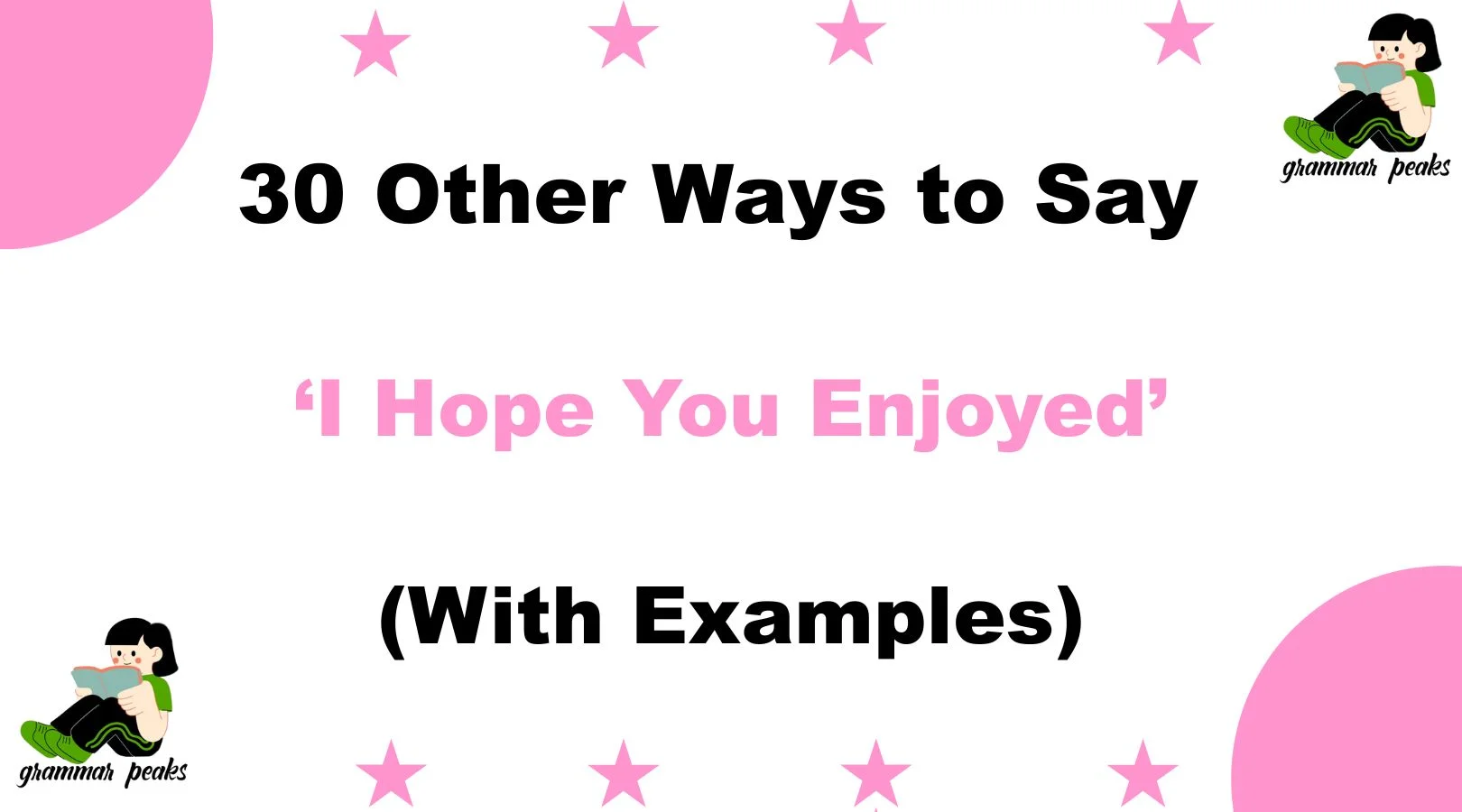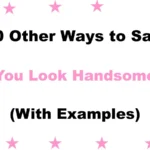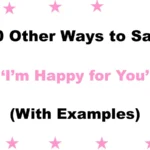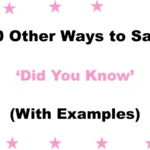When it comes to expressing genuine care in professional or friendly communication, the phrase “I hope you enjoyed” is often the go-to. But sometimes, using the same words over and over can make our messages feel flat or impersonal. Whether you’re writing a follow-up email, sending a thank-you message after an event, or wrapping up a presentation, finding fresh and thoughtful alternatives can leave a stronger impression.
The right phrase adds a touch of warmth and sincerity, making your message feel personal while keeping it professional and polished. Here, you’ll find 30 powerful and meaningful alternatives to help you connect more deeply with your audience while sounding original, warm, and attentive.
What Does “I Hope You Enjoyed” Mean?
“I hope you enjoyed” is a courteous and thoughtful phrase used to express your wish that someone had a pleasant or positive experience. It’s often said after an event, meal, service, or interaction and helps to show consideration and care for the other person’s comfort or satisfaction.
This phrase can strengthen relationships by adding a human touch to professional or personal exchanges.
When to Use “I Hope You Enjoyed”
- After an event or meeting
- In thank-you emails
- Following a presentation or webinar
- Post-purchase communication
- Client feedback follow-ups
- During formal or casual wrap-ups
Is It Professional/Polite to Say “I Hope You Enjoyed”?
Yes, “I hope you enjoyed” is polite and professional, especially when used in a context where you’re expressing appreciation or concern for someone’s experience. It shows that you care about their well-being and satisfaction, which is always a positive trait in communication. That said, depending on the tone you want to convey, you might prefer a more customized phrase to match the mood, audience, or setting.
Pros and Cons for saying “I Hope You Enjoyed”
Pros:
- Friendly and Courteous
- Widely Accepted in Business and Casual Settings
- Shows Genuine Concern for the Recipient’s Experience
Cons:
- May Sound Generic
- Easily Overused in Templates
- Lacks Personalization Without Context
Synonyms for “I Hope You Enjoyed”
- I trust you had a great time
- I hope everything met your expectations
- It was a pleasure having you
- I trust the experience was valuable
- I’m glad you could join us
- I hope you found it rewarding
- I trust it was worthwhile
- I hope you took something meaningful away
- I trust it met your needs
- I hope you found it insightful
- I appreciate your time with us
- I hope you had a positive experience
- I trust the session was informative
- I’m grateful for your participation
- I hope it brought value to your day
- I trust you enjoyed the discussion
- Thank you for your attention today
- I hope the content resonated with you
- It was a delight to have you
- I hope you felt welcome and engaged
- I hope it sparked some new ideas
- I trust this made an impact
- I appreciate you taking part
- I hope this served you well
- I’m thankful for your presence
- I hope you gained new perspectives
- I hope it was worth your time
- It was great to connect
- I hope you felt inspired
- I hope you walked away with something useful
1. I trust you had a great time
Definition: A confident way to express hope that someone had an enjoyable experience.
Detailed Explanation: This phrase projects trust and optimism while remaining courteous. It’s especially suitable after events or sessions that are meant to be enjoyable or engaging.
Scenario Example: After our networking lunch, I trust you had a great time connecting with fellow professionals.
Best Use: In post-event follow-ups or thank-you notes
Worst Use: In highly formal business documents
Tone: Friendly, confident, casual-professional
2. I hope everything met your expectations
Definition: A way of showing concern for satisfaction and alignment with anticipated outcomes.
Detailed Explanation: This phrase centers around whether the person’s goals or expectations were fulfilled, making it ideal in service-based or business settings.
Scenario Example: Following your recent order, I hope everything met your expectations.
Best Use: In client service follow-ups or after sales
Worst Use: In personal, casual conversations
Tone: Professional, customer-focused
3. It was a pleasure having you
Definition: A gracious way to express appreciation for someone’s presence or participation.
Detailed Explanation: This is a warm and polite phrase that communicates gratitude in a professional way.
Scenario Example: Thank you for attending our leadership roundtable—it was a pleasure having you.
Best Use: Event follow-ups, guest thank-yous
Worst Use: When addressing complaints or critical feedback
Tone: Grateful, professional, welcoming
4. I trust the experience was valuable
Definition: Expresses confidence that the person gained something meaningful from the experience.
Detailed Explanation: This phrase is often used in professional and educational settings to convey belief in the event’s benefit. It’s thoughtful and respectful of the recipient’s time.
Scenario Example: After our workshop, I trust the experience was valuable to your current project.
Best Use: In follow-up emails after learning sessions or consultations
Worst Use: In highly casual settings
Tone: Thoughtful, confident, professional
5. I’m glad you could join us
Definition: A warm way of expressing appreciation for someone’s presence.
Detailed Explanation: This shows you value their participation and makes the person feel welcomed and appreciated.
Scenario Example: I’m glad you could join us for the team-building session yesterday.
Best Use: Team events, virtual meetings, webinars
Worst Use: When following up on complaints or issues
Tone: Friendly, inclusive, genuine
6. I hope you found it rewarding
Definition: Shows care by wishing the person got something meaningful from the experience.
Detailed Explanation: It’s ideal for learning or personal development settings, where participants seek value.
Scenario Example: After your coaching session, I hope you found it rewarding.
Best Use: Professional development or mentoring
Worst Use: Product or service feedback
Tone: Encouraging, supportive, sincere
7. I trust it was worthwhile
Definition: A subtle way of checking whether the person’s time was well-spent.
Detailed Explanation: This sounds confident and considerate without being intrusive.
Scenario Example: Thank you for attending our demo—I trust it was worthwhile.
Best Use: Post-demo or event follow-ups
Worst Use: Casual or informal messages
Tone: Respectful, optimistic, businesslike
8. I hope you took something meaningful away
Definition: A kind way of acknowledging that the experience had value.
Detailed Explanation: It emphasizes the idea that even one small takeaway could make a difference.
Scenario Example: I hope you took something meaningful away from the workshop.
Best Use: After seminars, training, keynotes
Worst Use: Product-focused messaging
Tone: Warm, personal, reflective
9. I trust it met your needs
Definition: Indicates care about whether the experience fulfilled expectations.
Detailed Explanation: It’s customer-focused and suggests accountability.
Scenario Example: I trust it met your needs during your recent visit to our support center.
Best Use: Post-customer service or feedback requests
Worst Use: In emotional or creative contexts
Tone: Responsible, client-centered, professional
10. I hope you found it insightful
Definition: Shows you hope the experience offered new ideas or knowledge.
Detailed Explanation: Great for information-sharing events like webinars, workshops, or white papers.
Scenario Example: I hope you found it insightful and helpful for your next steps.
Best Use: Educational content follow-ups
Worst Use: After informal gatherings
Tone: Educational, thoughtful, polished
11. I appreciate your time with us
Definition: A direct and polite way of saying thank you.
Detailed Explanation: Focuses on gratitude and respect for the recipient’s time.
Scenario Example: I appreciate your time with us during the roundtable discussion.
Best Use: Post-meeting emails, client relations
Worst Use: For highly emotional or personal experiences
Tone: Grateful, professional, concise
12. I hope you had a positive experience
Definition: Expresses your wish that the person walked away feeling satisfied.
Detailed Explanation: Useful for any interaction where you want to check in politely.
Scenario Example: I hope you had a positive experience with our onboarding process.
Best Use: Service and support feedback
Worst Use: Social or casual settings
Tone: Friendly, optimistic, neutral
13. I trust the session was informative
Definition: Suggests that you believe the recipient learned something useful.
Detailed Explanation: Best used when discussing educational or data-heavy experiences.
Scenario Example: I trust the session was informative and clarified your concerns.
Best Use: Training, Q&A, consultation follow-ups
Worst Use: Light or fun events
Tone: Smart, formal, encouraging
14. I’m grateful for your participation
Definition: Shows appreciation for someone taking part in an event or activity.
Detailed Explanation: It adds a personal tone while still sounding professional.
Scenario Example: I’m grateful for your participation in this morning’s brainstorming session.
Best Use: Team activities, planning meetings
Worst Use: Feedback on services
Tone: Appreciative, respectful, warm
15. I hope it brought value to your day
Definition: Hopes that the experience made a meaningful difference to the recipient’s schedule.
Detailed Explanation: Shows you care about their time and daily priorities.
Scenario Example: I hope it brought value to your day and gave you actionable insights.
Best Use: Events, time-sensitive meetings
Worst Use: Product or sales-related outreach
Tone: Polite, empathetic, time-aware
16. I trust you enjoyed the discussion
Definition: Indicates confidence that the conversation was engaging and beneficial.
Detailed Explanation: Often used in follow-ups to meetings or panels.
Scenario Example: I trust you enjoyed the discussion on remote work trends.
Best Use: After open forums or think tanks
Worst Use: When the recipient was quiet or non-participative
Tone: Confident, inclusive, thoughtful
17. Thank you for your attention today
Definition: A polite way to acknowledge someone’s focus and presence.
Detailed Explanation: Great for presentations or webinars, where attention matters.
Scenario Example: Thank you for your attention today during the launch presentation.
Best Use: Presentations, pitches, online events
Worst Use: Personal notes or emotional conversations
Tone: Gracious, professional, structured
18. I hope the content resonated with you
Definition: Suggests you want the message to have connected with them on a deeper level.
Detailed Explanation: It’s emotionally aware and great for storytelling or values-driven content.
Scenario Example: I hope the content resonated with you during our leadership talk.
Best Use: Values-based or motivational content
Worst Use: After technical or purely data-based meetings
Tone: Warm, emotional, human-centered
19. It was a delight to have you
Definition: A cheerful and elegant way to say you appreciate someone’s presence.
Detailed Explanation: Brings a touch of formality and genuine joy to your message.
Scenario Example: It was a delight to have you attend our annual strategy luncheon.
Best Use: Formal events, speaking engagements
Worst Use: Everyday interactions
Tone: Elegant, respectful, enthusiastic
20. I hope you felt welcome and engaged
Definition: Combines emotional and interactive satisfaction.
Detailed Explanation: A very inclusive and kind phrase that’s perfect for group settings.
Scenario Example: I hope you felt welcome and engaged during the workshop.
Best Use: Team building, public events
Worst Use: In transactional customer service
Tone: Warm, inclusive, emotionally intelligent
21. I hope it sparked some new ideas
Definition: A creative way to wish someone left with fresh insights.
Detailed Explanation: Ideal after innovation-centered sessions.
Scenario Example: I hope it sparked some new ideas for your content strategy.
Best Use: Creative brainstorming, workshops
Worst Use: After purely analytical meetings
Tone: Creative, engaging, encouraging
22. I trust this made an impact
Definition: Shows belief that the experience had a meaningful effect.
Detailed Explanation: Confident and empowering, this phrase fits leadership contexts.
Scenario Example: I trust this made an impact on your team’s goals.
Best Use: Executive updates, strategic events
Worst Use: First-time meetings
Tone: Strong, positive, assertive
23. I appreciate you taking part
Definition: A friendly way to express gratitude for someone’s involvement.
Detailed Explanation: Polite, clear, and useful for team or community events.
Scenario Example: I appreciate you taking part in our Q&A session.
Best Use: Team calls, panels, group events
Worst Use: When only one person was involved
Tone: Friendly, grateful, warm
24. I hope this served you well
Definition: Indicates you hope the experience met a useful purpose.
Detailed Explanation: Useful for consultants, trainers, or service providers.
Scenario Example: I hope this served you well in preparing for your next campaign.
Best Use: Coaching, training, consulting
Worst Use: Fun or informal conversations
Tone: Helpful, practical, sincere
25. I’m thankful for your presence
Definition: A respectful and meaningful way to acknowledge someone being there.
Detailed Explanation: Best used when someone made an effort to attend.
Scenario Example: I’m thankful for your presence during such an important discussion.
Best Use: Formal gatherings, heartfelt moments
Worst Use: Surveys or automated emails
Tone: Grateful, sincere, respectful
26. I hope you gained new perspectives
Definition: Hopes that the experience broadened someone’s thinking.
Detailed Explanation: Ideal for workshops, talks, or discussions that challenge norms.
Scenario Example: I hope you gained new perspectives from our panel today.
Best Use: Thought leadership events
Worst Use: Service or product feedback
Tone: Reflective, intellectual, thoughtful
27. I hope it was worth your time
Definition: Expresses gratitude and concern for time well spent.
Detailed Explanation: Very polite and time-conscious.
Scenario Example: I hope it was worth your time joining us this morning.
Best Use: Busy professionals, executive briefings
Worst Use: Fun or celebratory messages
Tone: Humble, respectful, professional
28. It was great to connect
Definition: A modern and friendly way to say you enjoyed the interaction.
Detailed Explanation: Ideal for both casual and professional networking.
Scenario Example: It was great to connect during today’s strategy session.
Best Use: Post-networking or LinkedIn messages
Worst Use: Formal customer feedback
Tone: Conversational, approachable, professional
29. I hope you felt inspired
Definition: Aims to ensure the experience left a motivational effect.
Detailed Explanation: Strong for talks, storytelling, or passion-driven topics.
Scenario Example: I hope you felt inspired by the stories we shared today.
Best Use: Keynotes, leadership events
Worst Use: Data reports, customer service
Tone: Uplifting, emotional, impactful
30. I hope you walked away with something useful
Definition: Indicates a desire that the recipient found value in the experience.
Detailed Explanation: It’s conversational and thoughtful, focusing on practical takeaways.
Scenario Example: I hope you walked away with something useful from today’s session.
Best Use: After training or how-to sessions
Worst Use: Ceremonial or high-formality events
Tone: Casual-professional, helpful, genuine
Conclusion
Finding the right words to express care and appreciation can make a conversation feel more thoughtful and genuine. Whether you’re wrapping up a professional meeting, following up after a presentation, or simply closing a message with kindness, these 30 polished alternatives to “I hope you enjoyed” give you the freedom to sound both warm and professional.
Each phrase can help you build trust, show empathy, and leave a lasting positive impression. The key is to choose the one that best suits the tone, audience, and situation. Communication is more than formality—it’s about connection. Use these expressions to stay authentic while remaining polished. With the right phrasing, every message can feel like a human handshake.
FAQs
1. Is it okay to use “I hope you enjoyed” in formal emails?
Yes, but using a more specific alternative can sound more tailored and professional, especially in business or follow-up settings.
2. Which phrase works best for client meetings?
“I trust it was worthwhile” or “I hope it brought value to your day” sound professional, client-focused, and thoughtful for follow-up emails or conversations.
3. Can I use these alternatives in customer service emails?
Absolutely. Phrases like “I appreciate your time with us” or “I hope you had a positive experience” are ideal for maintaining a polite and respectful tone with customers.
4. Are these phrases suitable for leadership communication?
Yes, options like “I trust this made an impact” or “I hope you felt inspired” work well in motivational, visionary, or strategic contexts.
5. How do I choose the best phrase from the list?
Focus on your message’s tone, the formality of the situation, and the relationship with your recipient. Choose phrases that feel natural and sincere in your voice.

Mariah Cannon is a dedicated Senior Content Specialist at GrammarPeaks, known for her clear, engaging writing and deep knowledge of English grammar and usage. With a background in linguistics and years of experience in content development, Mariah crafts informative and accessible articles that empower readers to master the nuances of the English language. Her work reflects a commitment to clarity, education, and helping others express themselves with confidence.





